[size=200]The True Nature Of Reality[/size] [size=200](This Is It! To Disagree With This Description Of The Real World Is To Be DEAD WRONG!)[/size]
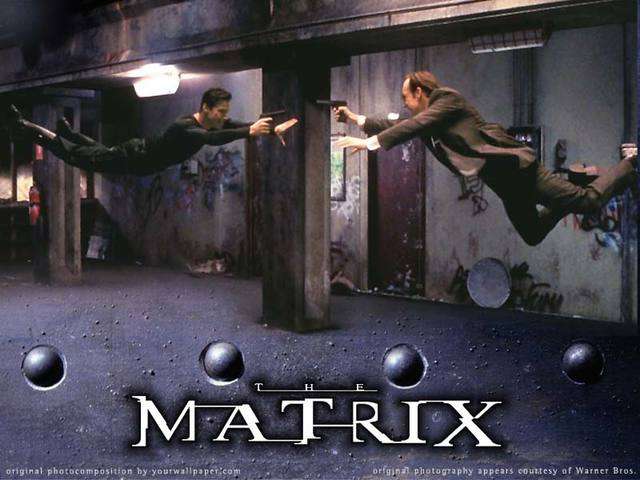
Most people, until they learn to think philosophically, are naive realists.
Naive Realism is the concept that what one perceives is actual objective reality:
“Naive realism is a common sense theory of perception. Most people, until they start reflecting philosophically, are naive realists.The most common theory of perception is naive realism in which people believe that what they perceive is things in themselves (interjection: that is, that what one perceives is the thing itself). Children develop this theory as a working hypothesis of how to deal with the world. Many people who have not studied biology carry this theory into adult life and regard their perception to be the world itself rather than a (interjection: virtual reality) pattern that overlays the form of the world.”
(Wikipedia, Naive Realism, Philosophy Of Perception, en.wikipedia.org/wiki/Naive_realism)
One can argue that the nature of the world entails the existence of not just one but two layers to reality:
b The Conscious Virtual Reality [/b](Consciousness itself as a virtual or simulated reality distinct from the real or external world)
b The External Zombie World[/b] (The external world believed to exist behind the existence of all consciousness----with consciousness believed to more or less accurately mimic the appearance and behavior of the external world)

(Fig. 1a) (Black and White) Zombie train as it is believed to exist in the external world beyond the existence of consciousness.

(Fig. 1b) b The same train as it appears to the visual experience of a conscious being observing the zombie world[/b]
Of the two realities, the existence of one is known due to the fact that it is experienced: the existence of the other is incapable of being experienced, and is known only through appeals to common sense, intuition, a psychological rather than empirical notion of likelihood or probability—and a secular version of faith.
b[/b] [b]Psychological likelihood and probability is distinct from empirical likelihood and probability, although these are often confused within philosophical debate.
Psychological probability and likelihood is derived from a powerfully suggestive conviction of a “greater reason to believe” a particular theory or hypothesis, despite the fact that the theory or hypothesis cannot be empirically proven through the use of sensory perception and/or internal cognitive, emotional, or mental state. The less true a hypothesis feels or sounds to the listener, the less (psychologically applied) the probability or likelihood of the objective truth of the hypothesis.
Empirical probability and likelihood is derived from the observation of physical behavior weighed against predicted probability given known physical laws, with the relevant probability tested through scientifically controlled experiment or observation of natural behavior beyond the laboratory.[/b]
b[/b] Secular faith, as (inadvertently) defined by astronomer Ned Wright, is the twin sister of theistic faith, and it is commonplace within godless theories concerning the origin of the universe, life, and the nature of reality. This faith is necessary, given the limitations of human consciousness and subjective experience. However, when accused of possessing ˜faith" in the objective truth of their explanations, certain atheistic philosophers and theorists mistakenly deny that many of their beliefs concerning the nature of the world requires faith. To illustrate this, one need only surmise that Wright’s definition of religious ˜faith" applies, upon further reasoning, even to godless explanations for the nature of the world.
“Most religious beliefs are matters of faith: a belief held in the absence of evidence (secular faith) or even despite contrary evidence (typical religious faith).”
(Wright, Ned: Science Is Based On Experience(Cosmology And Religion), astro.ucla.edu/`wright/cosmo-religion.html
A. The Zombie World
[b]The Zombie World is the external world of materialism, foundationalism, and realism, believed to exist independent of the existence of consciousness. It cannot be experienced, and as such is beyond empirical knowledge—yet it is strongly believed to exist due to a super-strong conviction that follows observation of a certain appearance to and behavior of the Conscious Virtual Reality of human (and presumably animal) conscious experience.
That is, the CVR consistently and predictably appears and behaves in such a way that it tends to generate an extremely powerful and almost unshakeable conviction that something exists beyond—and that this “beyond” somehow controls and maintains the existence and evolving nature of the CVR. This yields a persuasive inner suggestion that it is most likely (invoking a psychological rather than empirical likelihood) that the external world is somehow a facsimile represented by the CVR—rather than something whose appearance and behavior are wholly unrelated to the CVR.
Thus, the zombie world is characterized as a ˜real world" isomorphic counterpart to consciousness. Objects, places, and persons within the CVR possess a zombie counterpart, each sharing a dynamic isomorphism (in the sense that the behavior of the zombie world is mimicked in real-time by it’s conscious (virtual) twin).
[/b]
B. How Does One Deduce That The CVR Is Ontologically (Existentially) Distinct From The Zombie World?
The inference that the virtual reality of consciousness is something ontologically distinct from the external world (with such a realization defeating naive realism) follows from:
b The existence of sleep.[/b]
In sleep, there is a seeming discontinuity in conscious experience, with experience giving way to sudden or gradual unconsciousness, and unconsciousness giving way to sudden or gradually resumed waking consciousness. Unless one is a solipsist (who believes that only one’s own mind exists), there is good reason to believe that the universe does not cease to exist when one falls asleep (only to magically pop back into existence when one awakes).
b The existence of the effect of mind-altering drugs and brain/sensory pathology:[/b]
“A particularly interesting syndrome, left-sided neglect, which involves disturbance of higher-order perceptual functions, results from damage to the right parietal area (Mesulam, 1981). Patients with this syndrome neglect the left half of their body and the left side of space in front of them. When dressing, they fail to put the left hand into their shirt sleeve, or the left leg into their pants. When writing, they may only use the right side of the page, and when copying a figure, they may omit the part on the left side. Even when they shut their eyes and imagine a scene, say of a town square or of a particular room in their house, they describe what is to the right of the vantage point they have assumed, and they neglect the left side (Bisiach and Luzzatti, 1978).”
(Rosenhan, David L. and Seligman, Martin E. P: Abnormal Psychology, 2nd Edition, W.W. Norton & Company, New York 1986)
b The existence of death.[/b]
The ontological difference between the conscious virtual reality and the external zombie world is speculatively deduced from the conceivable subjective state of being dead, which (presumably) is indistinguishable from dreamless sleep. The concept of physical death is derived indirectly from the notion that the virtual reality of human experience is believed to fail the self-existence and eternity of the ZW (with the self-existence and eternity of the ZW due to the first law of thermodynamics). The proximity of the CVR to the physical brain aspect of the ZW also yields the inference and popular and pertinent belief that the CVR is somehow created by the electronic and chemical operations of the physical object known as the brain (psychophysicalism).
D. The Two Types of External World Beyond The Existence Of The Virtual Reality (Consciousness)
Regardless of whether or not one accepts psychophysicalism or is anti-psychophysicalist, the nature of reality can be reduced to two indistinguishable hypotheses:
b Objective Foundationalism[/b] (the view that there exists an objective reality behind conscious experience in the form of an external mind-independent world of some type):
Objective Foundationalism can decompose into two small and distinct hypothetical forms:
b[/b] Representational Foundationalism (in which conscious experience subjectively mimics the nature of the external zombie world)

b[/b] Non-Representational Foundationalism (in which the external world is wholly fails to resemble [yet somehow determines and controls] the nature of conscious experience, with such external world/conscious experience distinctions entailed within scenarios such as the Brain-In-A-Vat or Matrix Hypotheses)
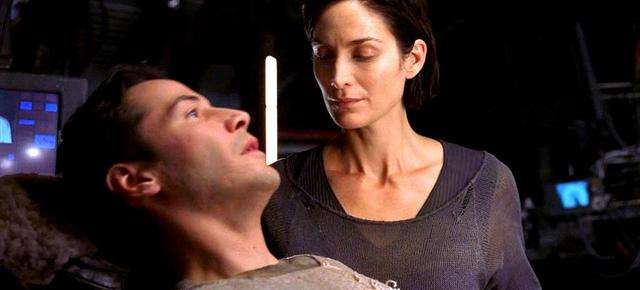
b[/b] Non-Foundational Objectivism (a view entailing either a solipsistic or quasi-solipsistic world in which only one mind or a world whose inhabitants are virtual minds existing independent of physical embodiment exists).
If one denies the existence of b[/b] above (or in the spirit of philosophical fair play chooses to safely lock it away within the filing cabinet of logical and metaphysical possibility), then the choices between a description of the true nature of reality are at last reduced to: b[/b] and b[/b] above, marching beneath the banner of Objective Foundationalism.
Given this, a final question emerges: If the world exists beneath Objective Foundationalism, then which of the two types of Objective Foundationalism describe the world: b[/b] or b[/b]?
E. Facsimile Realism
If one denies solipsism (the view that only one’s own mind exists) and philosophically transcends naive realism, then one most likely subscribes to Representational Foundationalism in the form of Facsimile Realism. Facsimile Realism is the most popular view of the nature of reality (for those who have moved beyond naive realism). Facsimile Realism is the view that subjective experience models and represents an isomorphic ˜external world" counterpart that exists independent of the existence of consciousness.

Facsimile realism is unquestionably taken for granted as truth. Yet given that the external world cannot be experienced, this truth is certainly not an empirical truth, as empirically, reality only presents itself as a simulated reality (according to facsimile realism, this simulated reality is a simulation of the external world). Given this, how does one become unwaveringly certain of the existence of a reality imagined to exist as a facsimile of one’s personal experience, if that reality lies beyond the power of one’s ‘virtual reality’ perception?
An almost unshakeable conviction in the truth of facsimile realism is created by:
b[/b] The logical suspicion that the existence of the Conscious Virtual Reality (CVR) seems to depend upon something that exists external to it, with changes in one’s conscious experience explicable to isomorphic real-time changes within the zombie replica of one’s perceived world. This explanation, despite being groundless, nevertheless arrives in the train of a powerfully persuasive conviction, which naggingly suggests that facsimile realism is the most likely (invoking a psychological likelihood) nature of the real world.
b[/b] The highly complex, multifaceted, and constantly evolving appearance and behavior of human experience itself. The world consistently appears and behaves in such a way that it produces an incredibly powerful suggestion that there “must” exist a ˜real world" zombie counterpart to this type of CVR.

[b]However, proof of the existence of facsimile realism seems only psychological, in the formation of an unshakeable conviction and a sense of reason that nags the subject, continuously persuading the subject that an empirically-inaccessible state of affairs is nevertheless somehow a certain truth. For die-hard adherents of facsimile realism (compared to the number of naive realists), this super-strong sense of the undeniable truth of FR is believed to follow from an inscrutable revelatory epistemic link between the external world and and belief in the nature of the external world.
This magical epistemic link is an aspect of externalism, the view that one can have knowledge, or have a justified belief, despite not knowing (having “access” to) the evidence, or other circumstances, that make the belief justified. An anti-facsimile realist, however, can point out that there exists a deep epistemological problem with such externalism, and that there exists no mystical revelatory knowledge of an empirically-inaccessible reality that unquestionably defeats viable counterpossibilities to Facsimile Realism.
If one denies this revelatory knowledge, then one enables an a priori justification for hypotheses that propose a Non-Representational Foundationalism (external realities that are unrelated in appearance and behavior to conscious experience, such as the Brain-In-A-Vat, Evil Genius, or Matrix Hypotheses) that cannot be ruled out (due to the indistinguishableness between FR and anti-FR). Anti-FR hypotheses are not obviously true, but one can argue that neither are they necessarily false.
[/b]
“I don’t know whether the Creation Hypothesis is true. But I don’t know for certain that it is false. The hypothesis is clearly coherent, and I cannot conclusively rule it out.”
(Chalmers, David J: The Matrix As Metaphysics, consc.net/papers/matrix.html)
F. Arguments Against Facsimile Realism
An anti-facsimile realist can point out (at least) two epistemological limitations that cripple the notion of the undeniable truth of Facsimile Realism:
b[/b] [b]There exists no rational basis for the existence of a mystical revelatory or truth-indicating link between the true objective nature of the external world (being empirically-inaccessible) and a subject’s belief in the objective nature of that world. The supposed link is believed to exist in the form of a powerfully suggestive feeling of the "ring of truth" to certain beliefs, such that these beliefs can be confidently asserted to be necessarily true independent of experience.
If a hypothesis based upon the conceivable nature of the world (fighting for parking space against equally viable counterpossibilities yielding the same indistinguishable evidence) is accompanied by an extremely powerful internal suggestive conviction of the truth of the presenting hypothesis (and if the presenting hypothesis obeys the dictates of common sense and is not obviously false), one is tempted to mistakenly and precipitously apply a necessary truth to the hypothesis—due to the failure of all the other viable counterpossibilities to form within the subject the same “truth-indicating” persuasion as the accepted hypothesis.
The anti-facsimile realist can argue that such “revelatory knowledge” is actually only a potentially fallible persuasion that seems to "indicate" the true nature of reality to the mind of a conscious being, causing that being to believe that the universe has “spoken in one’s ear” concerning the ‘truth’ of an empirically-inaccessible belief—decisively defeating all other logical counterpossibilities (rendering them necessarily false).
As David Hume rightly states (which such statement applying to the very notion of this magical “truth-whispering” revelatory link):
[/b]
“We are got into fairy land, long ere we have reached the last steps of our theory;
and there we have no reason to trust our common methods of argument, or to think
that our usual analogies and probabilities have any authority. Our line is too short to
fathom such immense abysses.”
b[/b] The anti-facsimile realist can appeal to a skepticism of process reliabilism in order to defeat the logical necessity of Facsimile Realism:
“Some find reliabilism of justification objectionable because it entails externalism, which is the view that one can have knowledge, or have a justified belief, despite not knowing (having “access” to) the evidence, or other circumstances, that make the belief justified. Most reliabilists maintain that a belief can be justified, or can constitute knowledge, even if the believer does not know about or understand the process that makes the belief reliable.”
(Wikipedia, Reliabilism, en.wikipedia.org/wiki/Process_reliabilism)
[b]Quite simply: if the physical brain is the sole arbiter of consciousness, then one can argue that beliefs are nothing more than the (cognitive rather than sensory or emotional) product of an electrochemically powered biological ˜computer" (the brain), such that belief becomes nothing more than potentially fallible output within the software of a physical machine, rather than an omniscient metaphysical revelator of empirically-inaccessible truth.
A skeptic of process reliabilism and externalism can make the following observations:
[/b]
b[/b] The cerebral cortex is the only aspect of the brain responsible for consciousness:
“The cerebrum, which is the only area of the brain responsible for consciousness, is the largest portion of the brain in humans. The outer layer of the cerebrum, called the cortex, is gray in color and contains cell bodies and short fibers. The cerebrum is divided into halves known as the right and left cerebral hemispheres. Each half contains four types of lobes: frontal, parietal, temporal, and occipital. The cerebrum can be mapped according to the particular functions of each of the lobes. The particular sensation produced is the prerogative of the area of the brain that is stimulated, since the nerve impulse itself always has the same nature.”
(Mader, Slyvia S: Inquiry Into Life, Fourth Edition Wm.C.Brown Publishers, Dubuque, Iowa 1976,1979,1982,1985)
The parietal, temporal, and occipital lobes are believed to determine the existence of sensory experience and certain emotions, and to relay motor commands from the frontal lobe. The frontal lobe, then, is the primary seat of thought and belief–including the belief in the objective truth of facsimile realism(!)
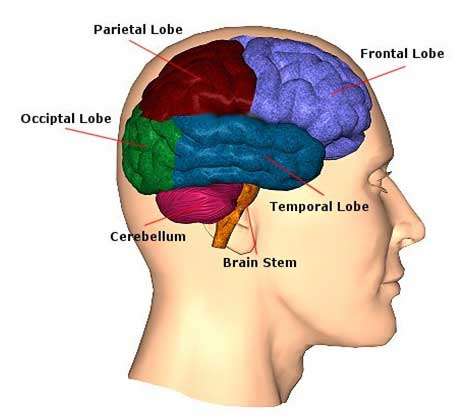
b[/b] It does not matter that the function of the cerebral cortex does not occur in a vacuum (that is, the function of one area of the brain requires the functioning of all others, with each supplying electrical power to the other through neurotransmitter action): regardless of how the cerebral cortex is dependent upon it’s non-consciousness producing neural and biological neighbors (as well as the external environment)for it’s cellular maintenance and electrical function—when it comes to consciousness-production, any aspect of the organism that is notthe cerebral cortex (including the environment itself) ultimately functions indirectly as a “battery” that continually charges and supports the electronics within the cerebrum.
b[/b] A skeptic of process reliabilism, then, can argue that the belief in facsimile realism (as well as anti-facsimile realism, paying homage to the arguments of Thomas Reid against skepticism itself) exists fundamentally as an aspect of a virtual reality computed to exist in the form of a cognition created by the physical brain (if one accepts psychophysicalism).
b[/b] [b]Given this, a skeptic of process reliabilism and externalism can hold that if causes precede effects, then all the conscious experiences of a being (including the cognitive experience of belief in an external world that is a foundational replica of one’s conscious experiences) are only fallible mechanical outputs (in terms of the fallibility of their ability to “mimic” or “tell of” the nature of reality) of the psychophysical relations that describe the consciousness-producing ability of the physical brain.
This skepticism seems prima facie justified, holding that the brain is mechanized to create beliefs that are themselves mechanically (in terms of the neural correlates of such beliefs) linked to the brain’s sensory mechanisms, such that the sensory mechanisms within the cerebral cortex lie adjacent to, electrically powers, and in turn is powered by the frontal lobe mechanisms that produce the powerful self-persuading conviction that there exists a ˜real world" counterpart to the sensory virtual reality output of the brain.
[/b]
Question: If Facsimile Realism is true, is not the external world reflected ONLY in visual perception? Is not every other aspect of sensory perception unique ONLY to the existence of consciousness???
[b]The skeptic of externalism and process reliabilism (and facsimile realism) can argue that the very idea of the ˜real world" counterpart is not a magical revelatory epiphany into the going’s-on of the external world, but one of several (potentially fallible) mechanical effects produced within the brain’s presumably limited catalog of logical algorithms (detailing the possible nature of the world).
In defense of Facsimile Realism, however, one can argue that like Anti-Facsimile Realism, it cannot conclusively be ruled out, such that an anti-FR philosopher should not necessarily discard FR outright, but safely file it away within the cognitive filing cabinet of metaphysical and logical possibility, leaving the jury out when it comes to the question of it’s objective truth.[/b]
Conclusion: Examples Of Non-Representational Virtual Reality Consciousness And End Summary
In conclusion, for those who embrace Anti-Facsimile Realism (or for those who at the least find it a somewhat interesting if objectionable possibility), there exist several Non-Representational Foundationalist hypotheses (secular or theistic) to choose from–with certain non-representational hypotheses believed to actually exist and others posited as thought-experiments or objects of fiction.
G. Secular Non-Representational Foundationalism
b The Dream Hypothesis[/b]
[b]"Dreaming provides a springboard for those who question whether our own reality may be an illusion. The ability of the brain to trick itself into believing a neurally generated world is the “real world” means one variety of simulation is a common, even nightly event.
Dreaming silences those who claim a simulated reality requires far fetched scientific technology, since the only apparatus needed to construct a simulated reality is a human brain. And since human brains currently exist and consistently mimic our reality this also eliminates Occam’s Razor as a valid defense for “realists” who dismiss the simulation hypothesis. Although Occam’s Razor is not a natural law, many skeptics defer to Occam’s Razor as a means of avoiding the simulation hypothesis. However, since we regularly create simulated realities in the form of dreams that fool those dreaming, the simple explanation could be that we’re always being tricked by our brain or an outside mechanism. The existence of dreams must be accounted for when examining the equality requirement of Occam’s Razor."[/b]
(Wikipedia, The Dream Argument, en.wikipedia.org/wiki/Dream_argument)
b Descartes’ Evil Genius Hypothesis
(3) The Brain In A Vat Hypothesis
(4) The Matrix or Simulation Hypothesis[/b]
H. Religious Or Theistic Non-Representational Foundationalism
bThe Biblically Errant Matrix Hypothesis[/b]
While not espoused by Fundamentalist Christianity itself, the Biblically Errant Matrix Hypothesis (Yes, a “biblically errant” rather than a “biblically inerrant” ‘Matrix’ hypothesis—BEMH) effectively solves the epistemological problems for Christianity posed by modern scientific discovery, secular philosophy, and seeming biblical contradiction. For example, the truth of the Genesis Creation Account seems constantly threatened by the Big Bang Theory (in terms of the empirical evidence of the galactic redshift and uniform background microwave radiation) and biological evolution of species from a single cellular organism through trial-and-error natural selection (inferred from the fossil record, the philosophy of Charles Darwin, and the works of Gregor Mendel, Friedrich Mieshcer, Francis Crick, and James Watson). The mounting physical and scientific evidence compels greater reason to believe in Evolution than the "magical" creation of Adam and Eve entailed within the Book of Genesis.
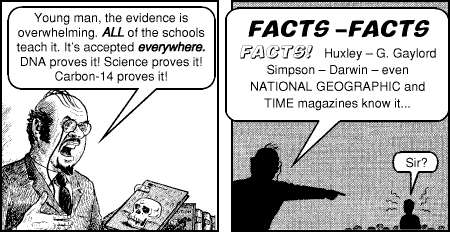
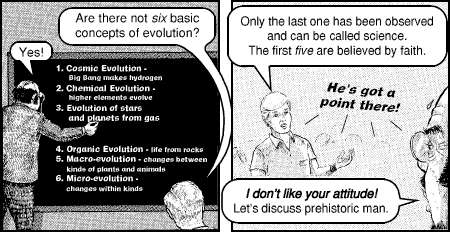
[b]Fundamentalist Christianity and believers in Intelligent Design, however, need not waste time jousting with the secular skeptic in a battle to the philosophical death over the true nature and origin of the experienced world. The threat of the truth of a godless Big Bang and the biological evolution of ape-like creatures into human beings can be lanced off it’s horse through the invocation of the Matrix Hypothesis, entailing a world in which the Judeo-Christian God traps human minds (with the deceived minds existing, for example, after the crucifixion and ascension of Jesus Christ) within a ˜Matrix" beyond which exists (or before which existed) a world that verifies (or would have verified) the inerrancy of biblical scripture.
If BEMH is true, the Big Bang and biological evolutionary through the mechanism of natural selection never occurred—except within the minds of beings encapsuled within an ingenious Bible-disproving Matrix (within this 'Matrix", humans are confronted with piling virtual evidence of the Big Bang and natural selection). The Genesis Account, however, is objectively true, and God causes post-crucifixion humans (test subjects trapped within a God-contrived, faith-testing world-simulation) to perceive scientific evidence that disproves the biblical Genesis Account of the origin of the universe and man.
The BEMH is a theistic version of Descartes’ Evil Genius Hypothesis, and if true it is implemented by God in order to cull the “sheep from the goats”—harvesting those who have faith in the inerrancy of the Bible (despite lack of evidence) from those who do not ----with the faithful holding fast despite the continuous piling of the evidence of a real world science, woefully ignorant and/or skeptical of the fact that it exists only within a simulated reality unrelated to the true nature of the external world.
The BEMH is also a version of the Omphalos Hypothesis. See: en.wikipedia.org/wiki/Omphalos_(theology
[/b]
I. The Superchristian Matrix Hypothesis
[b]According to Superchristianity, every event within the universe is related directly or indirectly to God’s omniscience (God’s foreknowledge of past, present, and future), with God the "cartoonist" that controls and determines even human will and destiny (theological determinism). To this end, the Superchristian Matrix Hypothesis posits that the Judeo-Christian God is yet another variant of Descartes’ Evil Genius, creating multiple first-person conscious ‘virtual people-virtual world’ programs to function as re-enactments of the imaginary characters perceived (pre-universe) within the omniscient mind of God. The purpose for this re-enactment is for the psychological and moral evolution of the characters (corresponding to further omniscient views of the future) into psychological and moral extensions of the mind of Jesus Christ (given that Jesus Christ is a moral and psychological ubermensch whose mind, according to Superchristianity, God intends to use as a template that redefines the perceptions and mentality of any being whom God wishes to live forever).
The essential nature or ‘substance’ of the Superchristian Matrix/Simulation is purely phenomenal (mental), as a mind-independent physical reality does not exist. With reality purely subjective (with consciousnesses existing within separate dimensions from other consciousnesses, with God as the foundational subjective “wall” from which all other minds are controlled) rather than physical, the SC Matrix Hypothesis posits a purely phenomenal world made up of phenomenal “bytes” or “pixels” that collectively creates it’s own ˜physics"—causal laws of nature existing only in the form of intersubjective (mental-to-mental) causation within a manifold of quasi-Berkelian idealism that appears and behaves in the same way as a physcial world obeying physical laws.
Thus human beings within the Superchristian Matrix Hypothesis actually exist within a “virtual people-virtual world” aspect of simulated reality:[/b]
Virtual people
“In a virtual-people simulation, every inhabitant is a native of the simulated world. They do not have a ‘real’ body in the ‘outside’ reality. Rather, each is a fully simulated entity, possessing an appropriate level of consciousness that is implemented using the simulation’s own logic (i.e. using its own physics). As such, they could be downloaded from one simulation to another, or even archived and resurrected at a later date.”
(Wikipedia: Simulated Reality, en.wikipedia.org/wiki/Simulated_reality)
Summary And Final Thoughts
At the end of the day, if an individual chooses to abandon naive realism as incoherent and counterintuitive (upon later introspective examination of the nature of one’s conscious experience), the only choices left for a description of the true nature of reality (beyond idealism) are Solipsism, Representational Foundationalism, and Non-Representational Foundationalism.
[b]Despite the matter of the fact that each yields indistinguishable evidence in terms of the appearance and behavior of the world, and each cannot conclusively rule the others out based upon what one knows or believes, it is a fact that humans tend to nevertheless find themselves persuaded that one hypothesis "possesses more of a ring of truth than the others, unfortunately, this persuasion tempts a belief in a revelatory magic that conveniently defeats all other viable counterpossibilities and “whispers” to the subject the “true nature” of an empirically-inaccessible reality.
This certain knowledge is believed to exist in the form of an exceptionally powerful conviction of the truth of a selected hypothesis (which in turn gives rise to a ˜rationality" that points the finger to suggest the concurrent ˜irrationality" of other counterpossibilities). Opponents can resist this magical epistemic externalism through the presentation of strong arguments against a mystical revelatory tie between belief and empirically-inaccessible objective reality, even going so far as to lay the logical cards on the table and express a skepticism of a psychophysically mechanized ability of the only consciousness-creating mechanism in the universe (the brain) to fabricate empirically-inaccessible revelatory knowledge, expressing criticism of the brain’s ability to produce certain knowledge of that which presumably exists beyond it’s mechanical capacity to perceive.
If these arguments go through, the True Nature of Reality can safely continue to (epistemically) hover listlessly between the cognitive netherworlds of Solipsism, Facsimile Realism, and Secular or Theistic Non-Representational Foundationalism.[/b]
